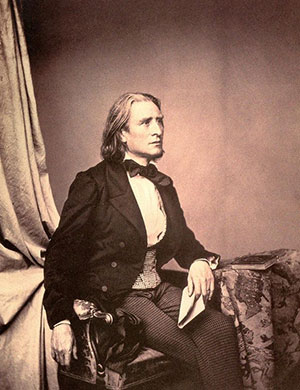 Although the feast of St. Francis on Oct. 4 is not often associated with music, there is a connection.
Although the feast of St. Francis on Oct. 4 is not often associated with music, there is a connection.
In the 19th century, a major shift occurred in music. As composers craved to express their art on a different level from that of the traditional “absolute music,” many began writing “program music” – that is, instrumental music that tells a story.
One of the masters of this genre was Franz Liszt (1811-’86), a Hungarian pianist who took Europe by storm with his unmatched technique. Although he is well-known for his significant contributions to music history, many are surprised to learn that he was a devout Catholic. While the feast of St. Francis (Oct. 4) is rarely associated with music, the first of Liszt’s “Deux Légendes” is based on this beloved saint.
Liszt was raised in the Catholic faith. His father wanted to be a Franciscan and named his son after the order. After an incredibly successful career, Franz moved to
Rome in 1861 to marry Princess Carolyne Sayn-Wittgenstein, but the annulment for her first marriage fell through, and the idea was abandoned. He stayed in the
Eternal City and pursued the minor clerical orders, subsequently being referred to as Abbé Liszt.
While in Rome, he composed “Deux Légendes” (“Two Legends”), the first entitled “St. Francois d’Assise-La prédication aux oiseaux” (“St. Francis of Assisi – the Sermon to the Birds”), inspired by Chapter 16 of “The Little Flowers of St. Francis of Assisi.” The Dover edition, translated by Thomas Okey, states: “My little sister the birds, much are ye beholden to God your Creator, and always and in every place ye ought to praise Him (…) God feedeth you and giveth you the rivers and the fountains for your drink; He giveth you the mountains and the valleys for your refuge, and the tall trees wherein to build your nests (…) wherefore your Creator loveth you much, (…) and therefore beware, little sisters of mine, of the sin of ingratitude, but ever strive to praise God.”
The 1966 Breitkopf & Härtel edition of the score includes Liszt’s own humility-filled preface: “My want of facility, and perhaps also the narrow limits of musical expression possible in a little work of small dimensions (...) have obliged me to restrain myself, and to greatly diminish the wonderful profusion of the text of the ‘Sermon to the little birds.’ I implore the ‘glorious poor servant of Christ’ to pardon me for having thus impoverished Him.”
By basing the work on this account, Liszt combined literature, nature and religion – all aspects that fascinated Romantic composers. The composition is for solo piano beginning with high notes to represent birds singing. They call back and forth before breaking into song, but when St. Francis begins to preach, a lower register of the piano is used to depict a man’s voice. A dialogue ensues between the saint and the birds, presented by low and high registers, respectively. Soon, the birds become so impressed with St. Francis’s preaching that they cease singing entirely to listen.
St. Francis is always associated with animals and nature, making him one of the most beloved saints in our history. (Our own family dog, Charlie Chuckles, wears a blessed St. Francis medal.) A popular quote erroneously attributed to St. Francis is “Preach the Gospel at all times. When necessary, use words.” Although there is no evidence he actually said those words, it is certainly applicable to the first of Liszt’s “Deux Légendes.”
— Christina L. Reitz
More online
Listen to Liszt’s “Légendes” and read further details on the composition:


